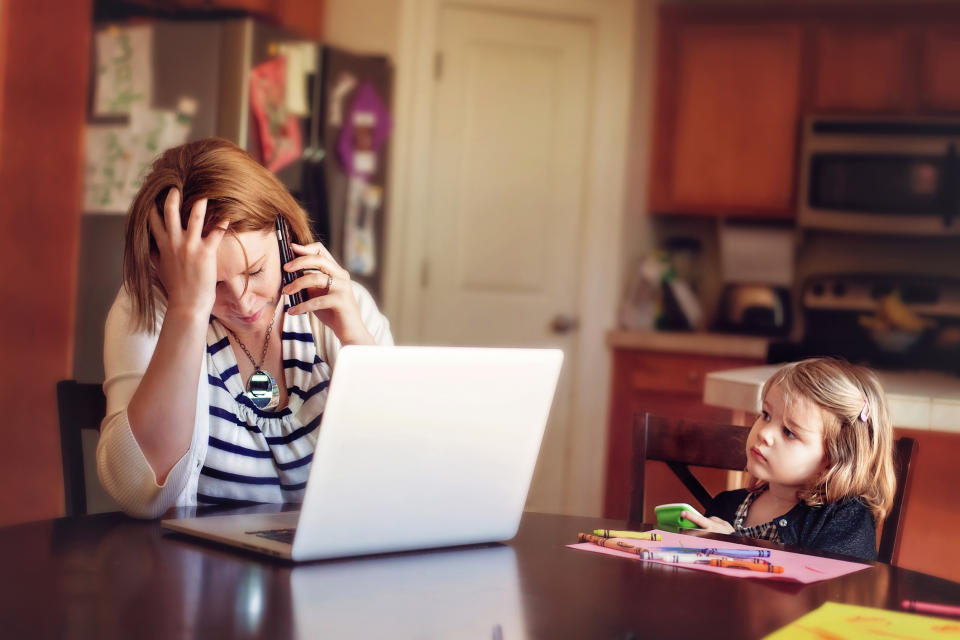Children can tell when parents are hiding their stress, study reveals

Feeling stressed about the coronavirus pandemic? Children will be able to tell, no matter how hard you try to hide it, new research has suggested.
If parents are feeling stressed, they will often try to hide those feelings to protect their children, but a new study has found that suppressing feelings can actually transmit those emotions to the kids.
The study, published in Journal of Family Psychology, analysed interactions between 107 parents, nearly half of whom were fathers, and their children between the ages of seven and 11.
Researchers collected baseline measurements from both parent and child before they asked each to list the top five topics that caused conflict between them.
The parents and children were then split up and each parent was asked to perform a stressful activity, such as public speaking, to activate the body’s stress response system.
Read more: Parents need to be aware of 'separation anxiety' caused by coronavirus lockdown
When the parent was suitably stressed, they brought their child back in and asked them to have a conversation about the topic that ranked highest on both of their conflict lists.
Half of the parents were asked to suppress their emotions during the conversation.
The interactions were all filmed and scored by third party viewers who didn't know which parents were in which group.
In addition the parents and children had sensors on their bodies to measure the physiological responses.
Results revealed that when parents tried to hide their emotions, children had a physical response.
“We show that the response happens under the skin,” lead study-author Sara Waters, assistant professor in Washington State University's Department of Human Development tells Science Daily.
“It shows what happens when we tell kids that we're fine when we're not. It comes from a good place; we don't want to stress them out. But we may be doing the exact opposite.”
Read more: How to talk to children about the coronavirus
Researchers also found that for the groups suppressing emotions, both parents and children were less warm and engaged with each other.
“That makes sense for a parent distracted by trying to keep their stress hidden, but the kids very quickly changed their behaviour to match the parent,” Waters said.
“So if you're stressed and just say, ‘Oh, I'm fine’, that only makes you less available to your child. We found that the kids picked up on that and reciprocated, which becomes a self-fulfilling dynamic.”
Scientists also discovered a difference between mothers and fathers in terms of transmitting stress to children.
“We found that mums and dads were different,” Waters explains. “We were looking for a physiological response, but there wasn’t one in either the control or the experimental condition where dads transmitted stress to their kids.”
Study authors hypothesised that fathers not transmitting their suppressed stress could be because dads tend to suppress their emotions around their children more than mothers do.
“The kids have experience with their dad saying things are fine even when they’re not. But it was more abnormal for kids to see their mum suppressing their emotions and they reacted to that,” Waters said.

Read more: How coronavirus measures may be affecting children's mental health
Researchers believe their findings could help parents support their children during the ongoing coronavirus pandemic.
“Research shows that it's more comforting for kids to have their feelings honoured than just be told ‘It's going to be fine,’” Waters said.
For example if a child says they are upset about not being able to see their friends or frustrated about not being able to do their favourite hobby, Waters suggests not immediately jumping to ‘fix’ that problem.
“Just sit with them and give them a chance to regulate those emotions on their own,” she said. “Try not to show that you're frustrated with them, or solve their problem. And try to do the same for yourself, give yourself permission to be frustrated and emotional.”
Waters and the research team were also keen to emphasise that they don’t want the results of the study to pile the pressure on already stressed parents.
“We don’t want this to be another thing that parents stress out about when raising their kids,” she said. “It’s not that you are screwing up, but honour your feelings and your child's feelings. Be brave enough to look at it. Kids will work their way through it; they’re good at it. Giving yourself permission to feel opens up your mind to more and better problem solving. It’s a good thing.”



